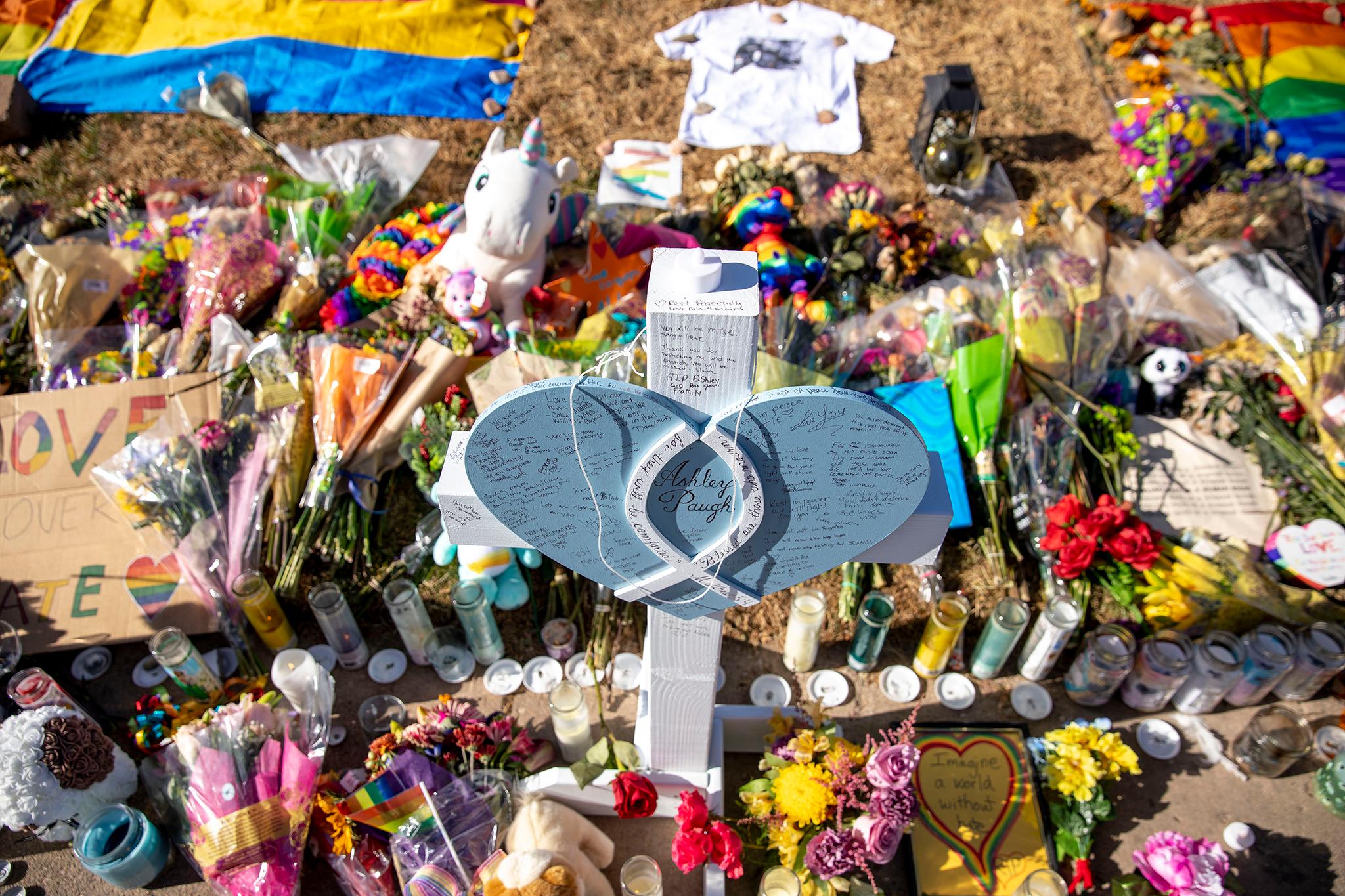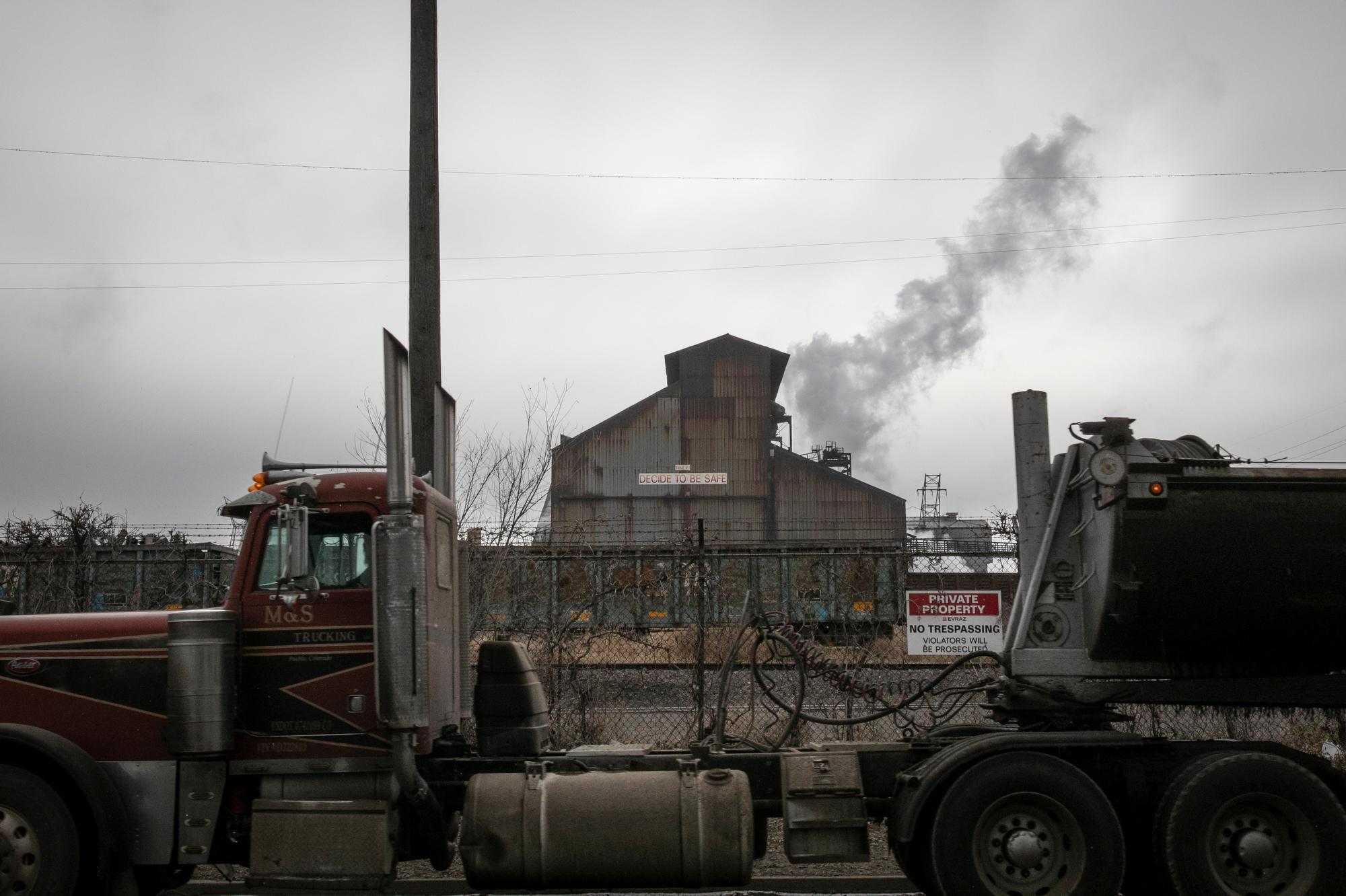
As condolences from across the country flowed in for victims of the Club Q shooting in Colorado Springs, some were sternly rejected by members of the queer community.
Both Rep. Lauren Boebert and former gubernatorial candidate Heidi Ganahl posted on Twitter that they would pray for everyone affected by Sunday’s mass shooting. LGBTQ people and allies promptly called out the two Republicans for transphobic and homophobic remarks they made while in office and on the campaign trail.
While it is still not clear what motivated the alleged shooter, the attack comes during a tense time among LGBTQ communities. The basic validity of transgender identity was heavily debated during the 2022 election, where transphobic campaign ads were sent to mailboxes and broadcast on television and radio stations.
“I would say I'm definitely nervous,” Burlie Gooch, who identifies as pansexual, said at the memorial outside Club Q. “I need to be careful and watch my surroundings, but it's not gonna stop me from wanting to live.”
Despite their messages of support in the shooting’s aftermath, experts and advocacy organizations say fear tactics and laws promoted by Boebert, Ganahl and other public figures have led to harassment and violence aimed at queer communities.
“They are the reason why these folks are so emboldened to harm our community, and they need to do some searching on the inside as to why they think it's okay to stand on the back of others for their own political success,” Nadine Bridges, executive director of LGBTQ advocacy nonprofit One Colorado, said.
During a Tuesday morning interview, Boebert told KOA, a commercial radio station in Denver, that it was “disgusting to try to blame” the attack on her. She then double-downed on the exact type of rhetoric Bridges and other advocates have criticized.
“What I've criticized is the sexualization of our children. And I've criticized men dressing up as caricatures of women and taking what is rightfully a woman’s, whether that be a position in the workforce, whether that is an award or a trophy or a medal that a girl has worked her entire life to practice … then a mediocre male athlete comes in and completely dominates her and takes what was rightfully hers,” she said.
Bridges said she’s seen a lot of anti-queer vitriol targeted at schools and their administrators
Schools have become a battleground for LGBTQ advocates and their opponents.
“I have attended many school board meetings where there has been just vile vitriol towards the community,” Bridges said. “[I’ve also been] attending public comment for State Board of Education meetings, where we hear some of the same hate speech towards the transgender non-binary and gender expansive community members.”
While campaigning this year, both Boebert and Ganahl made claims that furries, a subculture of people who create alter egos in the form of animal characters, are present in Colorado’s schools. Boebert went as far as saying some school officials had put litter boxes in bathrooms to accommodate students.
“It’s kids identifying as cats, and it’s actually a real thing. It’s just the trend happening in high schools and middle schools, where they don’t talk. They’re mutes,” Ganahl told CPR News in September.
The unsubstantiated claims may have helped fuel a viral TikTok trend that saw students place litter boxes in bathrooms themselves as a prank.
Some parents latched onto Ganahl’s claim, complaining to schools and districts who have denied there is a widespread problem involving furries. Experts and advocates say the claims are a form of veiled homophobia.
Recent discussions around identity and queerness have also impacted public school curricula. Conservative school board members at the state and local levels have argued that proposed social studies standards, which mandate the inclusion of minorities and other marginalized groups, including LGBTQ communities, is child indoctrination.
A committee that reported to the state Board of Education initially opted to remove requirements that teachers reference LGBTQ issues in classes below the fourth grade.
“The problem with the LGBTQ issues are not inclusion or exclusion, but whether the discussion of sex in its various forms is appropriate for kindergartners,” board vice-chair Steve Durham said in April.
Other board members pushed back, saying including perspectives from disadvantaged groups isn’t sexual in nature. The board eventually voted along party lines to approve changes to the curriculum, but the final draft restored references to marginalized groups, including LGBTQ perspectives, to all grade levels. It will go into effect next year.
Ari Drennen, who tracks misinformation about queer communities for Media Matters, said parents are easily targeted and swayed by disinformation campaigns that appeal to their protective nature.
“People are being radicalized by these groups forming on Facebook, like Moms for Liberty and some other groups like that, who are running for school board. They're going to school board meetings, they're coming in with these anti-LGBTQ conspiracy theories and the idea that they're there to stop people from basically turning gay,” Drennen said.
Advocates warn that anti-LGBTQ laws normalize the dehumanization of queer people
LGBTQ advocacy groups and government watchdogs have been tracking bills across the U.S., from federal and state governments, that have the potential to affect LGBTQ rights. While most bills attempting to limit LGBTQ rights at the state or federal level fail, some have become law.
“We've seen bans put into place on the ability of trans minors to access gender-affirming care. We've seen bans passed in multiple states that exclude trans people from athletic competition. We've seen laws like that ‘Don't Say Gay’ bill in Florida that really curtail the free speech of LGBTQ people in the classroom,” Drennen said.
Colorado lawmakers have largely avoided introducing those sorts of bills. Any attempt would likely be blocked by the Democratic majority and a group of moderate Republicans in the state legislature.
The national push to pass the Equality Act, a bill aiming to amend the Civil Rights Act of 1964 so that it prohibits discrimination based on sex, sexual orientation and gender identity, may bear fruit after passing through the House last year. Colorado’s congressional delegation was split when the bill came up for a vote. Republicans Doug Lamborn and Ken Buck voted against the bill, while Rep. Boebert urged others to follow her lead and not vote at all.
“Where is the equity in this legislation for the young girls across America who will have to look behind their backs as they change in school locker rooms, just to make sure there isn’t a confused man trying to catch a peek?” Boebert asked on the House floor. The bill is awaiting a hearing in front of the Senate Judiciary Committee.
Bridges said codifying laws that restrict the rights of LGBTQ people could further dehumanize the community.
“This is no longer just locker room talk, right? This is no longer about your transphobic, homophobic family members or neighbors who are making jokes. This is harming our community. It's creating trauma and violence. This type of language is violence towards our community,” Bridges said.
The alleged shooter in Sunday’s attack was arrested on charges of five counts of first-degree murder and five counts of bias-motivated crimes causing bodily injury — and was booked into the El Paso County jail Tuesday afternoon.
Editor's Note: Boebert, not Ganahl, has claimed school officials had put litter boxes in bathrooms to accommodate students. A previous version of this story had inaccurately stated Ganahl made that claim.









